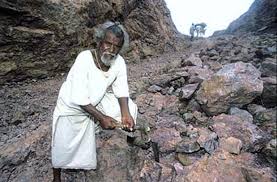Manjhi ~ The Mountain Man Poem by Hemendra Singh Deopa
Manjhi ~ The Mountain Man
Repressed by the social bias,
Living through the differences of so called superiors and inferiors by caste.
He lived to be nothing but humane,
In the darkness of the night of social apathy.
Lead by uppity leaders and gold diggers.
Exploited and harassed.
He found happiness in love of his wife.
Alas! his happiness didn't last.
For, he lost the love of his life,
to the mountain that she couldn't cross.
As she fell to death, once she came down.
Succumbed to death to her wounds and lack of treatment he couldn't afford.
as there were obstacles of poverty and that mountain.
The poor lost his love and his faith in life.
Only left with rage against the mountain of physical and social barriers once it did guard.
He sold his goats to buy a hammer and chisel,
To bring him salvation he was determined to break the mountain to carve a path.
By hammering that mountain, to breaking it through.
And did so with love in his heart as he prayed the stones and broke them every day, month and years for twenty two long long years of his quest.
He carved a niche and also carved that path.
That eventually lead to bring him solace and proved how love is much stronger in any race.
Alas! he left the world one fine day too,
Hoping his struggle might bring prosperity to his land.
A road that will be mighty as his faith.
He walked miles and miles to make it so
and returned empty handed but found his grace.
May the world knows his story and understands his agony.
May we learn by his angst against the social indifference for the poor, for the repressed.
And we shall be indebted to his legacy.

Phaguni, Dashrath’s wife, prepared for her treacherous climb up the mountain. She wrapped the ‘rotis’ (bread) , filled a container with a thin curry, and bundled the food into a square of cloth. She picked a small pot of water, and hoisted it on her head. Her children sat playing by their hut in the small Musahar settlement in the mountain’s shadow.
He would watch and wait for Phaguni. That day, she would come to him empty handed, injured. As the harsh sun beat down, Phaguni tripped on loose rock, and was badly injured. Her water pot shattered. She slid down several feet, injuring her leg. Hours past noon, she limped to her husband. He was angry at her for being late.
Dashrath bought a hammer, chisel, and crowbar. He had to sell his goats, which meant a lower income for his family. He climbed to the top, and started chipping away at the mountain. Years later, he would recount.
Word spread far and wide. He would start early in the morning, chip the mountain for a few hours, then work on the fields, and come back to work on the mountain again. He would hardly sleep. The villagers gradually began to respect him, and started donating food to his family. He eventually quit his wage job, and started spending as much time as he could, breaking the mountain.
Then, Phaguni fell ill. The doctor was in Wazirganj, which stood just on the other side of the mountain, but the road leading to it was 75 kilometers long. Unable to make the journey, she passed away. Her death not only enraged him more, it spurred him on.
He decided to break the mountain to carve a path for his people and next generations to come and for the love of his wife.
It was not an easy task. He would often get hurt by the rocks falling from the unyielding mountain. He would rest and then start again. At times, he helped people carry their things over the mountain for a small fee, money to feed his children. After 10 years, as Manjhi chipped away, people saw a cleft in the mountain and some came to help.
Manjhi broke through that last thin wall of rock, and walked into the other side of the mountain. After 22 years, Dashrath Das Manjhi, the common man, the landless laborer, had broken the mountain: he had carved out a road 360 feet long,30 feet wide. Wazirganj, with its doctors, jobs, and school, was now only 5 kilometers away. People from 60 villages in Atri could use his road.
There is a fine movie out there as well now. Watch it if it moves you too.
This poem has not been translated into any other language yet.
I would like to translate this poem
What a coincidence! i read about it in the papers. but they had put up the pictures of the actors instead of the Manjihi. You have done a wonderful work. not just the poem; i see it as a genuine plea for all to recognize this poor man's plight. The suffering of the village. He is done the job of what the politicians should do. To carve an entire passage through the mountain! through this poem i should say, Manjihi's word is indeed mightier than the mountain. and Hemendra you have done a mighty task to write it so beautifully...thank you. May i rate your poem a 10...
Thank you a lot for your appreciation, and I would like to share, I was actually very moved by his story. The man was so strong that not a lot of people can imagine to be, Thanks again with all due respect.